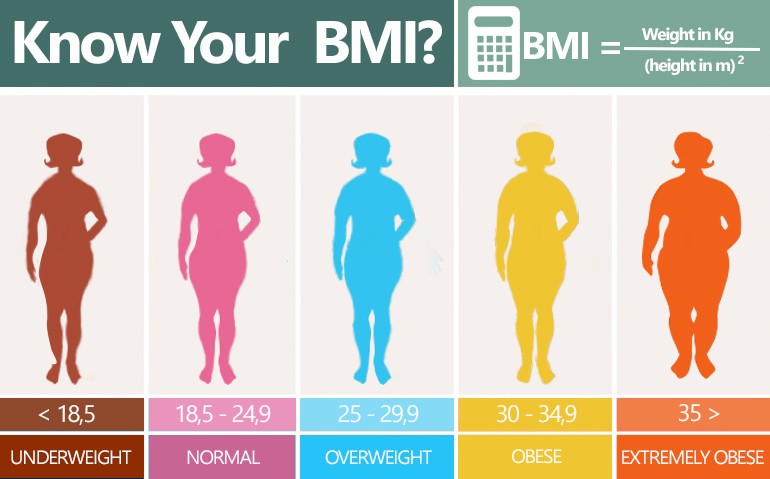What’s your BMI?
 It is important to have a few tools to set a bench mark and track your progress. Each tool by itself, has its limitations, but collectively they can be great benchmarks and tracking of progress.
It is important to have a few tools to set a bench mark and track your progress. Each tool by itself, has its limitations, but collectively they can be great benchmarks and tracking of progress.
Keeping track of weight is important, however, I recommend getting on the scale no more than once a week. Once a month is even better. For those of you who that cannot resist, just keep in mind, that your weight will fluctuate throughout the day and will be slightly different depending on what scale you use. Be CONSISTENT with the time of day that you get on the scale and with the scale you use.
Body Mass Index (BMI) is also useful. It is a mathematical formula that calculates your weight in relation to your height. The National Institute of Health uses this measurement to define if you are you are underweight or overweight instead of the traditional weight and height charts.
A high BMI is an indicator of a high body fat percentage. Limitations of BMI are that it can overestimate body fat in athletes and those who have a muscular body type. It can also underestimate body fat in older adults and others who have loss muscle.
In adults, BMI < 18.5 is underweight.
18.5 – 24.9 is normal.
>25 – 29.9 is overweight .
>30 is obese.
Measuring Waist Circumference is one of my favorite tools.
Along with BMI a a good indicator of risk of heart disease, type 2 diabetes, and other degenerative diseases.
Use a tape measure to measure around your waist, just above your hips, after exhaling.
If you have more weight around your waist instead of your hips, you are at greater risk.
In general, women should have a waist circumference 35 and under. Men 40 and under.
For even greater accuracy, use Waist-to-Hip Ratio.
In addition to measuring your waist; measure around your hips.
Waist divided by Hips = Waist-to-Hip Ratio.
What the results Mean:
Females | Estimated health risk | Estimated body shape |
0.80 or below | Low | Pear |
0.81 to 0.85 | Moderate | Avocado |
0.85+ | High | Apple |
Males | Estimated health risk | Estimated body shape |
0.95 or below | Low | Pear |
0.96 to 1.0 | Moderate | Avocado |
1.0+ | High | Apple |



